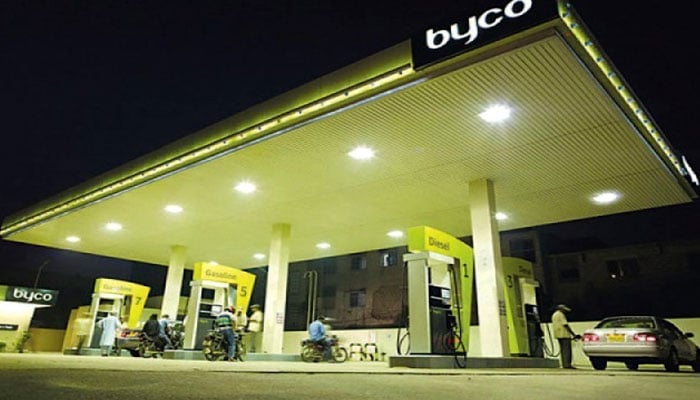Byco begins constructingplants for Euro 5, 6 gas, diesel
KARACHI: Oil refiner Byco has begun construction works on two plants to reduce sulphur content in diesel and convert furnace oil into gasoline and diesel, the company said on Tuesday.
Byco became the first refinery in Pakistan to announce plans of upgrading facilities to ensure environmental compliance and sustainable profitability
The company begun civil works construction earlier this year at its refining complex. In April last year, Byco announced plans to upgrade its refining complex with the installation of two major new additions to its refineries: diesel hydro desulphurising (DHDS) and fluidised catalytic cracking (FCC) units.
“As per our planned schedule, Byco has commenced civil works for the installation of our DHDS and FCC units,” Wasi Khan, chairman of Byco said in a statement.
“The addition of the DHDS and FCC facilities to our refining complex will enable Byco to produce Euro 5 and Euro 6 compliant diesel and gasoline as per the government’s directive.” Khan further said the upgrade will enable Byco to reduce production of low value furnace oil and enhance products’ quality, making them better for the environment as well as more valuable for business.
The new units to be installed include pre and post treatment plants, including amine and sour water systems and sulphur recovery plant, vacuum distillation, selective hydrogenation process, alkylation, catalytic naphtha hydrotreater, catalytic reformer, dimersol, gasoline merox, sweet frac, C3, C4 splitter and gas condensation units.
Byco is also engaged in petroleum marketing and logistics. The company was able to limit the reduction in the company’s gross sales to 5 percent for the year to June 30 through implementation of strategies.
The company posted loss of Rs2.4 billion in FY2020 compared to loss of Rs1.6 billion a year earlier.
Byco’s gross profits, however, increased 48 percent to Rs2.9 billion from Rs1.9 billion due to better pricing of crude cargos. Operating expenses remained within budget. Due to rupee depreciation, the company booked an exchange loss of Rs514 million. Finance costs increased due to higher interest rates.
The global energy industry was facing some of the most daunting challenges ever as lockdown related to COVID-19 brought business activities to a standstill and decimated fuel demand.
In Pakistan, oil demand fell 35 percent following nationwide lockdown for over three months.
However, sales of petroleum products increased 11 percent to 8.1 million tons during the first five months of the current fiscal year of 2020/21 as reopening of economy boosted energy demand.
-
 Charlize Theron Delivers Strong Message At 2026 Winter Olympics Opening Ceremony
Charlize Theron Delivers Strong Message At 2026 Winter Olympics Opening Ceremony -
 Lil Jon Reacts To Son Nathan Smith's Death: 'Devastated'
Lil Jon Reacts To Son Nathan Smith's Death: 'Devastated' -
 Bianca Censori Reveals Where She And Kanye West Stand On Having Children Together
Bianca Censori Reveals Where She And Kanye West Stand On Having Children Together -
 Taylor Swift Hypes Olympic Athletes In Surprise Video Message
Taylor Swift Hypes Olympic Athletes In Surprise Video Message -
 Timothy Busfield Charged With Four Counts Of Child Sexual Abuse
Timothy Busfield Charged With Four Counts Of Child Sexual Abuse -
 Kanye West First Contacted Bianca Censori While In Marriage To Kim Kardashian?
Kanye West First Contacted Bianca Censori While In Marriage To Kim Kardashian? -
 Travis Kelce Reveals What His Nieces Really Do When He, Taylor Swift Visit
Travis Kelce Reveals What His Nieces Really Do When He, Taylor Swift Visit -
 Lola Young Makes Career Announcement After Stepping Back From Touring
Lola Young Makes Career Announcement After Stepping Back From Touring -
 Priyanka Chopra Shares Heartfelt Message For Nick Jonas
Priyanka Chopra Shares Heartfelt Message For Nick Jonas -
 Spotify, Major Labels File $13b Lawsuit Over Alleged Music Scraping
Spotify, Major Labels File $13b Lawsuit Over Alleged Music Scraping -
 Travis Kelce Opens Up About Being Backup Plan For His Nieces
Travis Kelce Opens Up About Being Backup Plan For His Nieces -
 Winter Olympics 2026: Chinese Robot Dance Goes Viral In Milan
Winter Olympics 2026: Chinese Robot Dance Goes Viral In Milan -
 Jessica Biel Urged To Divorce Justin Timberlake?
Jessica Biel Urged To Divorce Justin Timberlake? -
 Rebecca Ferguson Gets Honest About Having First Kid With 22 Year Older Man
Rebecca Ferguson Gets Honest About Having First Kid With 22 Year Older Man -
 Epstein Ties: UK Police Search Properties In Probe Into Peter Mandelson
Epstein Ties: UK Police Search Properties In Probe Into Peter Mandelson -
 Andrew Mountbatten-Windsor’s Friendship With A Child Sex Offender Turns His Future Murkier
Andrew Mountbatten-Windsor’s Friendship With A Child Sex Offender Turns His Future Murkier




